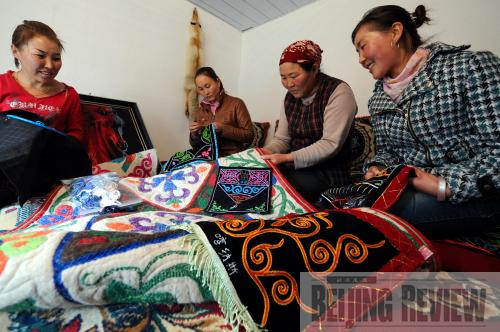|
 |
|
PRACTICAL ART: Rural women's employment program participants in four villages in Xinjiang Uygur Autonomous Region create art to be sold as tourist souvenirs. The program, started by the local government, has helped more than 2,000 women (SHEN QIAO) |
Society has long considered sexual harassment an immoral behavior and has dictated that violators be punished under public security laws. Since the dawn of the new century, more and more people have come to realize that sexual harassment is not a morality violation, but a crime. The amendment to the Law on the Protection of Women's Rights and Interests, issued in 2005, was the first to clearly prohibit sexual harassment against women. Article 40 of the revised law states, "Sexual harassment against women is banned. The victims shall be entitled to complain to their employers or the relevant organs."
On April 20, 2007, at a sexual harassment trial in Shaanxi Province, the judge cited clauses from the 2005 law and ruled that the accused harasser should apologize to the female victim and pay her 15,000 yuan ($2,200) for mental damages. It was the first ruling to cite the women's rights law.
Legal experts say that the addition of "respect for and protection of human rights" to the Constitution was an important step that led to the creation of the new sexual harassment law.
"The amendment of 2004 has reflected the country's emphasis on respecting and protecting the dignity of citizens and is a major step forward for China's legislative system in regard to the protection of women's rights," said Zhang Rongli, a professor at Beijing-based China Women's University, during an interview with China Women's News. She said the amended law has provided concrete protection for women's political, educational, employment and property rights along with their rights in regard to marriages and families.
Right to property
A traditional Chinese proverb says, "Married daughters are the water splashed out." This saying is the result of a patriarchal system that sees a married woman as the property of her husband's family and has no connection with her own parents' family. This idea is the consequence of the cultural norm whereby the woman bears offspring who carry the husband's family name rather than her family's name.
Eight years ago, some villagers' committees in Anhui Province used these old biases to deprive women who married men outside the village of the right to keep the land they had contracts to farm before being married.
These women filed lawsuits against this gender-based violation, but did not have a specific law they could call on to protect their rights until 2002's Law on the Contracting of Rural Land.
To deal with gender discrimination in rural land contracting, which had become a national concern, the law clearly stipulates that men and women have equal rights to contract rural land. Throughout the duration of the contract, a woman who gets married but has no land contracted to her in her new domicile will be entitled to use the land originally contracted to her.
The Property Law, which was effective in 2007, offered another layer of protection for married women's contracted land by regulating that when the legitimate rights and interests of any member of the collective are infringed upon by any decision made by a collective economic organization, villagers' committee or the principle thereof, such members may require the people's court to cancel the decision. During some land rights violation lawsuits, villagers' committees voted to pass resolutions to withdraw a woman's land.
Though Chinese women are an active part of the labor market, it remains more difficult for a female university graduate to find an ideal job than her equally qualified male classmates. Debates among new female university graduates over the relative importance of either finding an ideal husband or finding a good job end in draws on the Internet and in public polls.
To eliminate any form of gender discrimination in the labor market, the Employment Promotion Law, which took effect on January 1, 2008, clearly stipulates that no one seeking employment shall suffer discrimination on the grounds of ethnicity, race, gender or religious beliefs. | 